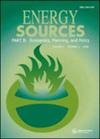能源贫困与经济脆弱性之间的关系:来自中低收入经济体的证据
IF 2.2
4区 工程技术
Q3 ENERGY & FUELS
Energy Sources Part B-Economics Planning and Policy
Pub Date : 2022-03-24
DOI:10.1080/15567249.2022.2056264
引用次数: 3
摘要
能源贫困是可持续发展的重要方面之一,但人们对能源贫困与经济脆弱性的联系关注较少。本研究提出,两个变量之间存在相互联系,并通过73个低收入和中等收入经济体的样本进行了检验。将面板格兰杰因果关系和两步系统广义矩估计方法应用于两个变量的系统方程,得到了鲁棒性结果。首先,经济脆弱性与能源贫困之间的相互因果关系得到了证明。其次,经济脆弱性对能源贫困的影响似乎越来越大;反过来,能源贫困对经济脆弱性也显示出类似的影响。第三,这种联系在46个低收入和中低收入经济体以及27个中高收入经济体中基本一致。研究结果表明,在全球一级,经济脆弱性和能源贫穷之间存在着重要的相互联系,因此需要采取紧急行动,制定适当的政策来处理能源贫穷问题本文章由计算机程序翻译,如有差异,请以英文原文为准。
Nexus between energy poverty and economic vulnerability: Evidence from low and middle income economies
ABSTRACT Energy poverty is one of the important facets of sustainable development, but less attention to the linkage of energy poverty to economic vulnerability. This study proposes that two variables would have a mutual linkage, which is tested through a sample of 73 low- and middle-income economies. By applying panel Granger causality and two-step system generalised method of moments estimate to a system equation of two variables, the robust results are as follows. First, mutual causalities between economic vulnerability and energy poverty are evidenced. Second, economic vulnerability appears to have an increased influence on energy poverty; and energy poverty, in return, shows similar effects on economic vulnerability. Third, the nexus is mostly consistent in 46 low- and lower-middle-income economies and 27 upper-middle-income economies. The results indicate the important mutual link between economic vulnerability and energy poverty at a global level, which demands urgent action on appropriate policies to deal with energy poverty
求助全文
通过发布文献求助,成功后即可免费获取论文全文。
去求助
来源期刊

Energy Sources Part B-Economics Planning and Policy
ENERGY & FUELS-
CiteScore
6.80
自引率
12.80%
发文量
42
审稿时长
6-12 weeks
期刊介绍:
12 issues per year
Abstracted and/or indexed in: Applied Science & Technology Index; API Abstracts/Literature; Automatic Subject Index Citation; BIOSIS Previews; Cabell’s Directory of Publishing Opportunities in Economics and Finance; Chemical Abstracts; CSA Aquatic Science & Fisheries Abstracts; CSA Environmental Sciences & Pollution Management Database; CSA Pollution Abstracts; Current Contents/Engineering, Technology & Applied Sciences; Directory of Industry Data Sources; Economic Abstracts; Electrical and Electronics Abstracts; Energy Information Abstracts; Energy Research Abstracts; Engineering Index Monthly; Environmental Abstracts; Environmental Periodicals Bibliography (EPB); International Abstracts in Operations Research; Operations/Research/Management Science Abstracts; Petroleum Abstracts; Physikalische Berichte; and Science Citation Index.
Taylor & Francis make every effort to ensure the accuracy of all the information (the "Content") contained in our publications. However, Taylor & Francis, our agents, and our licensors make no representations or warranties whatsoever as to the accuracy, completeness, or suitability for any purpose of the Content. Any opinions and views expressed in this publication are the opinions and views of the authors, and are not the views of or endorsed by Taylor & Francis. The accuracy of the Content should not be relied upon and should be independently verified with primary sources of information. Taylor & Francis shall not be liable for any losses, actions, claims, proceedings, demands, costs, expenses, damages, and other liabilities whatsoever or howsoever caused arising directly or indirectly in connection with, in relation to, or arising out of the use of the Content. Terms & Conditions of access and use can be found at http://www.tandfonline.com/page/terms-and-conditions .
 求助内容:
求助内容: 应助结果提醒方式:
应助结果提醒方式:


